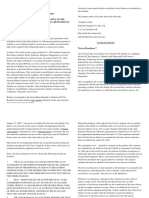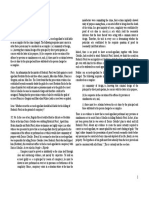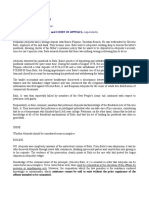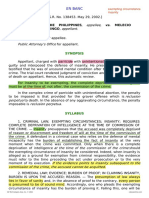131 People V Kiichi Omine
131 People V Kiichi Omine
Uploaded by
SDN HelplineCopyright:
Available Formats
131 People V Kiichi Omine
131 People V Kiichi Omine
Uploaded by
SDN HelplineOriginal Description:
Original Title
Copyright
Available Formats
Share this document
Did you find this document useful?
Is this content inappropriate?
Copyright:
Available Formats
131 People V Kiichi Omine
131 People V Kiichi Omine
Uploaded by
SDN HelplineCopyright:
Available Formats
PEOPLE v.
KIICHI OMINE
61 Phil 609 (1935)
FACTS:
Defendants Eduardo Autor, Luis Ladion and Agapito Cortesano were working
under co-defendant Kiichi Omine, the overseer or manager of the hemp
plantation owned by Angel Pulido. The 4 defendants lived together in a house
on the plantation. Kiichi Omine asked Angel Pulido for permission to open a
new road through the plantation. According to Omine, Pulido did give his
permission so he began working on the new road. But according to Pulido, he
refused to grant this request because there was already an unfinished road.
As Pulido and his son along with 2 others were returning home from a cockpit,
they noticed that a considerable number of hemp plants destroyed by the
construction of the new road. There is a sharp conflict in the evidence as to
what followed. The witnesses for the prosecution contend that while the
offended party was talking with Omine, Eduardo Autor attempted to intervene,
but was prevented by Hilario Pulido; that Eduardo Autor attacked Hilario Pulido
with a bolo, but did not wound him except on the left thumb; that Luis Ladion
and Agapito Cortesano then held Angel Pulido by the arms, and when Eduardo
Autor approached, Omine shouted to him "pegale y matale", and Autor struck
Angel Pulido in the breast with his bolo.
ISSUE:
Whether or not Kiichi Omine is a principal by induction
HELD:
No. Although it is alleged that Kiichi Omine uttered words of inducement to
Eduardo Autor, it would be insufficient to make him a principal by induction.
Eduardo Autor, though working under the direction of Omine was still being
paid by Pulido. Moreover, it is necessary that inducement be made directly w/
the intention of procuring the commission of the crime and that such
inducement be the determining cause of the commission of the crime. It must
precede the act induced and must be so influential in producing the criminal
act that without it the act wouldn‘t have been performed. Moreover, as words of
direct inducement, it is essential that such advice or words have great
dominance and great influence over the person who acts, that they be as direct,
as efficacious, as powerful as physical or moral coercion or as violence itself.
on Angel Pulido.
You might also like
- People vs. Opuran Case DigestDocument2 pagesPeople vs. Opuran Case DigestLaurence ObaobNo ratings yet
- People V Kiichi OmineDocument2 pagesPeople V Kiichi OmineCecille Sarita100% (2)
- People V Kiichi OmineDocument2 pagesPeople V Kiichi Ominexynister designsNo ratings yet
- People v. Jaurigue 76 Phil. 174 DigestedDocument1 pagePeople v. Jaurigue 76 Phil. 174 DigestedJacquelyn AlegriaNo ratings yet
- United States v. Bumanglag, 14 Phil. 644 (1909)Document1 pageUnited States v. Bumanglag, 14 Phil. 644 (1909)Nico IanNo ratings yet
- People vs. BigcasDocument3 pagesPeople vs. BigcasHANNAH GRACE TEODOSIONo ratings yet
- Vino v. PeopleDocument5 pagesVino v. PeopleJose MendozaNo ratings yet
- People V RocheDocument1 pagePeople V RocheJaz SumalinogNo ratings yet
- People Vs PajaresDocument4 pagesPeople Vs PajaresDanny DayanNo ratings yet
- People vs. PajaresDocument1 pagePeople vs. PajaresDanielleNo ratings yet
- People v. IndananDocument2 pagesPeople v. IndananKristine0% (1)
- People V LeonorDocument1 pagePeople V LeonorPam RamosNo ratings yet
- People V LatupanDocument2 pagesPeople V LatupanJerric CristobalNo ratings yet
- People v. Discalsota G.R. No. 136892Document7 pagesPeople v. Discalsota G.R. No. 136892Peter RojasNo ratings yet
- 7 Sabang Vs PeopleDocument3 pages7 Sabang Vs PeopleCyres JaneNo ratings yet
- People V ElijordeDocument2 pagesPeople V Elijorderalph_atmosferaNo ratings yet
- People V SumicadDocument1 pagePeople V SumicadPam Ramos100% (1)
- 111 US vs. Dela CruzDocument2 pages111 US vs. Dela CruzPrieti Hooman100% (1)
- People Vs Leuterio DIGESTDocument2 pagesPeople Vs Leuterio DIGESTJohn Fredrick BucuNo ratings yet
- People of The Philippines vs. Jesus Retubado: FactsDocument10 pagesPeople of The Philippines vs. Jesus Retubado: FactsAnonymous fL9dwyfekNo ratings yet
- People v. Sumicad, 56 Phil. 643 (1932)Document5 pagesPeople v. Sumicad, 56 Phil. 643 (1932)Glenn caraig100% (1)
- 008 185 Scra 554 May 21 1990 People V BadillaDocument2 pages008 185 Scra 554 May 21 1990 People V BadillaManuelMarasiganMismanosNo ratings yet
- People v. Ravelo: Facts: The Accused Pedro Ravelo, BonifacioDocument3 pagesPeople v. Ravelo: Facts: The Accused Pedro Ravelo, BonifacioNathalie Jean Yap100% (1)
- Criminal Law Case Digests PDFDocument10 pagesCriminal Law Case Digests PDFCabaron Jose GabrielNo ratings yet
- RagundiazDocument2 pagesRagundiazRNJNo ratings yet
- People vs. Barroga, G.R. No. 31563, 16 January 1930Document3 pagesPeople vs. Barroga, G.R. No. 31563, 16 January 1930LASNo ratings yet
- People v. IlaoaDocument3 pagesPeople v. IlaoaNico Delos TrinosNo ratings yet
- People of The Philippines v. FedericoDocument5 pagesPeople of The Philippines v. FedericoJolas E. Brutas100% (1)
- People v. Gelaver Case DigestDocument1 pagePeople v. Gelaver Case DigestIvan ArchilleNo ratings yet
- People vs. de LeonDocument2 pagesPeople vs. de LeonPrieti HoomanNo ratings yet
- 8.people vs. Domingo UralDocument2 pages8.people vs. Domingo UralRochedale ColasiNo ratings yet
- G.R. No. 80130 August 19, 1991 BENJAMIN ABEJUELA, Petitioner, People of The Philippines and Court of Appeals, RespondentsDocument2 pagesG.R. No. 80130 August 19, 1991 BENJAMIN ABEJUELA, Petitioner, People of The Philippines and Court of Appeals, RespondentsUrsulaine Grace FelicianoNo ratings yet
- 129 People v. Bibat, G.R. No. 124319, 13 May 1998, 290 SCRA 27Document1 page129 People v. Bibat, G.R. No. 124319, 13 May 1998, 290 SCRA 27Mario MorenoNo ratings yet
- People Vs SangalangDocument2 pagesPeople Vs SangalangHANNAH GRACE TEODOSIONo ratings yet
- People v. EriniaDocument1 pagePeople v. EriniaSamantha Ann T. TirthdasNo ratings yet
- Us Vs EduaveDocument2 pagesUs Vs EduaveJoyleen HebronNo ratings yet
- Crim DigestsDocument3 pagesCrim DigestsColee Stifler0% (1)
- US v. HicksDocument2 pagesUS v. HicksLizzie Geraldino50% (2)
- 61 Phil 703, PP Vs LamahangDocument3 pages61 Phil 703, PP Vs LamahanggcantiverosNo ratings yet
- People V BuanDocument2 pagesPeople V BuanJohn BasNo ratings yet
- People Vs Guillen Case DigestDocument1 pagePeople Vs Guillen Case DigestJet jet NuevaNo ratings yet
- 116 People vs. Rodil, 109 SCRA 308 (1981)Document2 pages116 People vs. Rodil, 109 SCRA 308 (1981)Angelica Alvero100% (3)
- Case Digest Criminal ReviewDocument9 pagesCase Digest Criminal ReviewmelfabianNo ratings yet
- People v. Robiños, G.R. No. 138453, 29 May 2002Document13 pagesPeople v. Robiños, G.R. No. 138453, 29 May 2002Isabella EncarnacionNo ratings yet
- (CD) US Vs Manalinde - G.R. No. 5292 - AZapantaDocument2 pages(CD) US Vs Manalinde - G.R. No. 5292 - AZapantaThe Concerned LawstudentNo ratings yet
- People Vs TejeroDocument2 pagesPeople Vs TejeroGoodyNo ratings yet
- People Vs Luciano Barroga - DigestDocument1 pagePeople Vs Luciano Barroga - DigestJeo CacalNo ratings yet
- People v. Luague, 62 Phil. 504 (1935)Document2 pagesPeople v. Luague, 62 Phil. 504 (1935)Nico Ian100% (3)
- People Vs Rubiso GR 128871 03182003Document4 pagesPeople Vs Rubiso GR 128871 03182003Hey it's RayaNo ratings yet
- Crim1 - US vs. Bumanglag, 14 Phil. 644 - DefenseofPropertyDocument1 pageCrim1 - US vs. Bumanglag, 14 Phil. 644 - DefenseofPropertyJustin Reden BautistaNo ratings yet
- 62 People vs. Tac-An G.R. Nos. 76338-39 February 26, 1990Document3 pages62 People vs. Tac-An G.R. Nos. 76338-39 February 26, 1990RexNo ratings yet
- (04.a.01.c.01) People V MontealegreDocument2 pages(04.a.01.c.01) People V MontealegreMaya Tolentino100% (2)
- People V UralDocument2 pagesPeople V UralBea CapeNo ratings yet
- Us Vs BumanglagDocument1 pageUs Vs BumanglagColee StiflerNo ratings yet
- Criminal Law - Compilation of DigestsDocument33 pagesCriminal Law - Compilation of DigestsPrinz Hernan Bautista100% (7)
- 3 Crim1 - People Vs Leonor - Sufficient ProvocationDocument2 pages3 Crim1 - People Vs Leonor - Sufficient ProvocationJustin Reden BautistaNo ratings yet
- G.R. No. L-42476Document3 pagesG.R. No. L-42476MarielNo ratings yet
- 6 People V Kiichi OmineDocument2 pages6 People V Kiichi OmineFrances Angelica Domini KoNo ratings yet
- Jose Ma. Capili and Habana and Quimpo For Appellants. Office of The Solicitor-General Hilado For AppelleeDocument3 pagesJose Ma. Capili and Habana and Quimpo For Appellants. Office of The Solicitor-General Hilado For AppelleeheyoooNo ratings yet
- Plaintiff-Appellee Vs Vs Defendants-Appellants Jose Ma. Capili Habana & Quimpo Solicitor-General HiladoDocument5 pagesPlaintiff-Appellee Vs Vs Defendants-Appellants Jose Ma. Capili Habana & Quimpo Solicitor-General HiladoMalagant EscuderoNo ratings yet
- 29 Aldover Vs CA 2013Document17 pages29 Aldover Vs CA 2013SDN HelplineNo ratings yet
- 16 Aceveda Vs People 2021Document95 pages16 Aceveda Vs People 2021SDN HelplineNo ratings yet
- 62 Fernando Cs ST Scholastica 2013Document17 pages62 Fernando Cs ST Scholastica 2013SDN HelplineNo ratings yet
- 60 Bogo Medellin Vs CA 2003Document11 pages60 Bogo Medellin Vs CA 2003SDN HelplineNo ratings yet
- 5 South Pachem Dev Vs CA 2004Document8 pages5 South Pachem Dev Vs CA 2004SDN HelplineNo ratings yet
- 52 Frondarina Vs Malazarte 2006Document12 pages52 Frondarina Vs Malazarte 2006SDN HelplineNo ratings yet
- 1 Alano Vs Magud-Logmao 2014Document29 pages1 Alano Vs Magud-Logmao 2014SDN HelplineNo ratings yet
- 23 Go Vs Looyuko 2013Document6 pages23 Go Vs Looyuko 2013SDN HelplineNo ratings yet
- 33 Automat Realty Vs Dela Cruz 2014Document20 pages33 Automat Realty Vs Dela Cruz 2014SDN HelplineNo ratings yet
- First Division (G.R. No. 107764, October 04, 2002) : Carpio, J.: The CaseDocument27 pagesFirst Division (G.R. No. 107764, October 04, 2002) : Carpio, J.: The CaseSDN HelplineNo ratings yet
- 82 Abs-Cbn Vs Gozon 2015Document55 pages82 Abs-Cbn Vs Gozon 2015SDN HelplineNo ratings yet
- 12 Chavez Vs NHA 2007Document60 pages12 Chavez Vs NHA 2007SDN HelplineNo ratings yet
- 8 UBFHAI Vs Paranaque 2007Document13 pages8 UBFHAI Vs Paranaque 2007SDN HelplineNo ratings yet
- 7 Maria Luisa Park Vs Almendras 2009Document11 pages7 Maria Luisa Park Vs Almendras 2009SDN HelplineNo ratings yet
- 6 Barrientos Vs Daarol 1993Document6 pages6 Barrientos Vs Daarol 1993SDN HelplineNo ratings yet
- 7 Korea Exchange Bank Vs Filkor Business Integrated 2002Document5 pages7 Korea Exchange Bank Vs Filkor Business Integrated 2002SDN HelplineNo ratings yet
- 34 NHA Vs Baello 2013Document11 pages34 NHA Vs Baello 2013SDN HelplineNo ratings yet
- 12 Cua Lai Chu Vs Lacqui 2010Document5 pages12 Cua Lai Chu Vs Lacqui 2010SDN HelplineNo ratings yet
- 48 Duncan Assn. of Detailman Vs Glaxo Wellcome Phils G.R. No. 162994Document5 pages48 Duncan Assn. of Detailman Vs Glaxo Wellcome Phils G.R. No. 162994SDN HelplineNo ratings yet
- 14 Phil Lawyers Assoc Vs Agrava 1959Document5 pages14 Phil Lawyers Assoc Vs Agrava 1959SDN HelplineNo ratings yet
- 50 Avon Cosmetics Vs Leticia Luna G.R. No. 153674Document6 pages50 Avon Cosmetics Vs Leticia Luna G.R. No. 153674SDN HelplineNo ratings yet
















































































